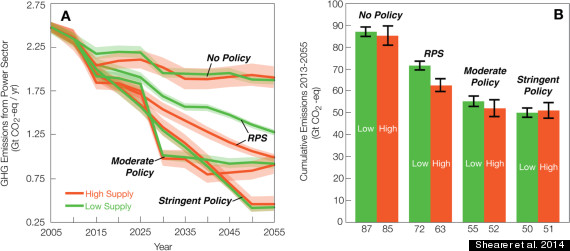Natural gas may not be a "bridge fuel" to a clean energy future, according to a new study by researchers at UC Irvine, Stanford University and the energy nonprofit Near Zero. Their modeling found that having a high supply of natural gas does little to reduce greenhouse gas emissions in the future, largely because the use of gas slowed the transition to renewables.
The study, published on Sept. 24 in the journal Environmental Research Letters, modeled the impacts of high and low supplies of natural gas on overall emissions from the energy sector. Researchers studied the impacts of abundant natural gas over a range of potential future climate policies, including no limit on carbon emissions, a moderate carbon tax, a strict carbon cap and a federal requirement that 50 percent of energy come from renewable sources by 2050. They found that though increased availability of gas led to less use of coal, it also slowed the adoption of renewable technologies under all scenarios but the requirement to use renewables.
They also found that, if there were no limits on carbon pollution, more abundant and cheaper natural gas led to increased electricity use. "The availability of low-cost, abundant gas lowers energy prices, which increases energy consumption and [greenhouse gas] emissions," the study's lead author, Christine Shearer, told The Huffington Post.
Burning natural gas produces roughly half as much carbon dioxide per unit of energy as burning coal, so it is often touted as a way to reduce greenhouse gas emissions while transitioning to renewable energy. But because abundant natural gas competes with renewable energy, greenhouse gas emissions were not significantly reduced in the models.

Greenhouse gas emissions from the power sector, under various climate policies and under high or low supply of natural gas. The difference in greenhouse gas emissions between high and low supply of natural gas is small in all scenarios, but is the largest under the renewable portfolio standard (RPS).
President Barack Obama said during his 2014 State of the Union address that natural gas, "if extracted safely," can be "the 'bridge fuel' that can power our economy with less of the carbon pollution that causes climate change." Much of the growth in natural gas production in the United States comes from shale gas, which is projected to continue to grow in the future. This growth is largely due to increased use of hydraulic fracturing, or fracking, to tap into gas contained in shale formations.
"Our study suggests fracking is a poor strategy for lowering [greenhouse gas] emissions," Shearer told HuffPost. "In our results, increased gas use lowered U.S. [greenhouse gas] emissions, at most, 13 percent through 2055." Even that reduction, Shearer said, was possible only if the federal government also implemented a policy requiring 50 percent of U.S. electricity to be drawn from renewable sources by 2050 (a policy often referred to as a renewable electricity standard or renewable portfolio standard). "Otherwise, increased gas consumption had very little effect on [greenhouse gas] emissions," Shearer said.
Shearer also said their models found this to be true regardless of the level of anticipated methane gas leakage. Methane, which is the primary component of natural gas, is a potent greenhouse gas. Some research has found that methane leakage from gas wells could also negate the benefits of lower carbon dioxide emissions that come from burning natural gas.
Ultimately, "the biggest driver of emissions reductions was a climate policy, not the amount of natural gas," Shearer explains in a video accompanying the study. "For gas to be effective in lowering emissions," Shearer told HuffPost, "we should strengthen and expand existing state renewable portfolio standards, which would help minimize the competition between gas and renewable electricity."
"Cutting greenhouse gas emissions by burning natural gas is like dieting by eating reduced-fat cookies," said professor Steven Davis, the study's principal investigator, in a statement. "It may be better than eating full-fat cookies, but if you really want to lose weight, you probably need to avoid cookies altogether."
